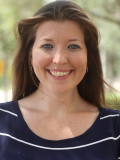|

Anastasia Khawaja
University of South Florida, Tampa, Florida, USA
|
|

Riah Werner
National Pedagogical Institute for Technical & Professional Training, Abidjan, Côte d'Ivoire
|
Hello SRIS,
Thank you for taking the time
to read our December issue of the Social Responsibility Interest
Section (SRIS) newsletter, TESOLers for Social
Responsibility. These days, every day seems like a battle. The
news is constant and overwhelming at times. We have had a record
intensity of natural disasters, massacres, attacks, and thousands of
people coming forward to reveal their experiences with sexual harassment
and assault in just the past few months. It has truly been a trying
time in the United States and the world. It is by uniting that we stay
strong. This community of activists, scholars, teachers, and
professionals has been a source of strength and inspiration for us as we
continue to navigate through these trying times. We have tried to do
our part to provide support and resources for all of you through this
newsletter. Over the past couple issues, we have brought you
postconvention inspirations and pieces championing identity and
inclusion in our field from all over the world. For this issue, we felt
it appropriate to exhibit a theme that highlights how these pioneering
and groundbreaking ideas can actually be applied in the classroom. As we
have continued to emphasize in each of our issues, the work that we do
has become more critical than ever, and your participation in submitting
your work has been an integral part of the success of our
newsletter.
As the proud editors, we find it is of the utmost importance to
offer a platform for voices across the globe. We are pleased that the
issue we present to you continues to do just that. The writers who have
contributed to this issue showcase a diverse set of ideas on practical
ways we can bring social justice elements into our classrooms. Their
perspectives are their own, and our newsletter should be taken as a
forum for our membership to share their views about issues that are
important to them, which may or may not reflect the opinions or official
positions of TESOL International Association.
This issue starts with a letter from our chair, Laura Jacob,
who has reported more details about the new strands within SRIS,
distilled from the survey that was dispersed over the summer. Please
read her letter and take the follow-up survey. If you would like to be
more involved with SRIS, you might also consider volunteering to lead
one of the strands.
Next, we have four articles that demonstrate how teachers can
incorporate social justice into their classes through lesson plans and
curricula. We begin with two articles that detail insightful lessons on
social justice issues. First, in “The N-Word: How to Engage ELLs’
Sociocultural Understanding,” Kendra Staley provides a lesson plan she
designed to engage her beginning level Colombian students in a deep
exploration of the N-word’s history and cultural context. Then Lucas
Kohnke’s “Social Responsibility in the Digital Age: A Step-by-Step Guide
to Student-Created Videos” outlines his approach to creating short
videos on social issues with his students. Next, we shift our focus
outward and examine courses and programs as a whole. In “Justice in
Society Starts in the Classroom and the Community,” Janna L. Corn
details her approach to teaching a social justice class, with sample
readings and descriptions of how she facilitates community-based service
learning. Looking at the effects of her graduate program’s commitment
to developing critical consciousness in teacher candidates, Carli
Danaher reflects on the transformation of her teacher identity in
“Teacher Identity and Social Justice: A Graduate Student’s
Transformative Journey.”
We are also very honored to bring you a special article about
the urgent situation in Puerto Rico. Rosita L. Rivera and Edward
Contreras provide a harrowing first-person account of Hurricane Maria,
how they are rebuilding, and most important, how we, SRIS, can help in
their recovery efforts.
The theme for our next issue is quite timely, and it follows
the academic session which has been planned for our interest section
during the upcoming TESOL convention in Chicago next March: Social
Responsibility in the Current Political Climate. We strongly encourage
submissions showcasing how you have dealt with the topics of politics in
your classroom or how politics may have affected your classroom
environment and how you have handled it. We are excited to see where
this conversation goes. Submissions are due on 15 January. Please see
the call for submissions for
more details.
Finally, TESOL recently held elections for leadership positions
in the Interest Sections, as well as for TESOL as a whole. Thank you,
SRIS, for choosing us as your incoming chair elects! We are so excited
to be taking on a new role in the interest section, and we thank you for
placing your confidence in us as we continue the amazing work the
leadership team has started during this year of IS transitions. We would
also like to congratulate Elisabeth Chan, an important member of our
SRIS family, on her election to TESOL’s nominating committee. Elisabeth
served as chair of SRIS from 2015–2016 and has contributed a great deal
to the success of this interest section. Thank you Elisabeth! We wish
her all the best in her new role. We also want to thank all of you for
your incredible contributions to our interest section newsletter this
year and your unwavering dedication. As long as we continue to fight the
good fight through our teaching, research, and advocacy, there is still
hope for a brighter future. Let us remember and reflect on this as we
close out 2017 and look toward 2018.
Anastasia and Riah
Anastasia Khawaja has been in the TESOL teaching
profession for 10 years. She is a doctoral candidate in second language
acquisition/instructional technology at the University of South Florida.
Her dissertation research focuses on the emotions associated with
languages that Palestinians use in Palestine and in the diaspora. She
currently holds the position of senior instructor at INTO University of
South Florida and has international teaching experience in Peru, South
Korea, and the United Arab Emirates.
Riah Werner is an English teacher and teacher trainer
who has taught in Tanzania, South Korea, Thailand, Ecuador, and Cote
D’Ivoire and trained more than 200 teachers. She holds an MA in TESOL
from the SIT Graduate Institute. Her research interests include drama
and the arts, social justice in ELT, and locally contextualized
pedagogy. She documents her projects and blogs about the articles she
reads at riahwerner.com. |

